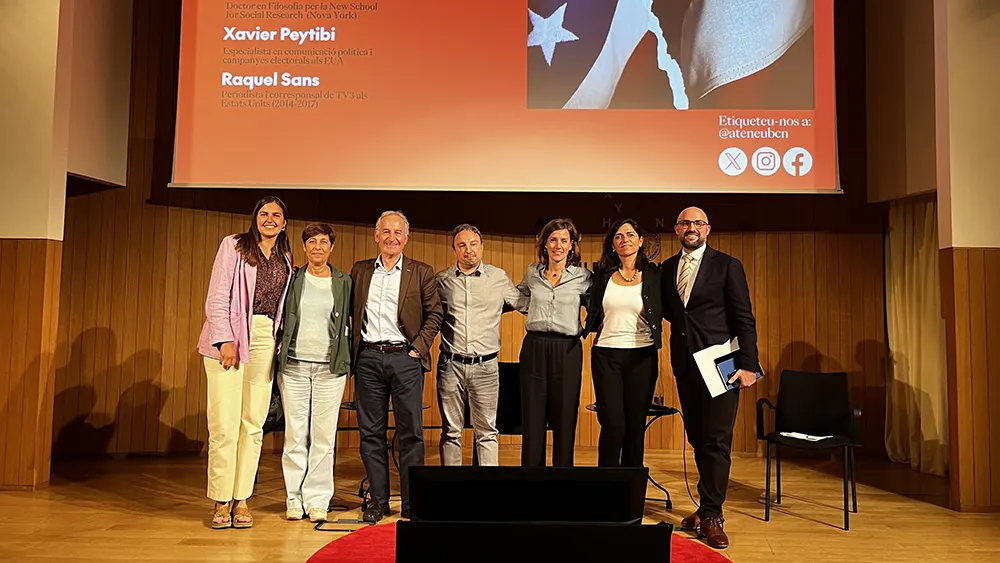The United States on the Edge? A Portrait of a Nation Between Two Visions
Chronicle of the event ``Beyond Harris - Trump: Anatomy of a Divided Country”
On October 17, the Ateneu Barcelonès hosted a political analysis event organized in collaboration with the Institut d’Estudis Nordamericans. With the U.S. presidential elections on the horizon, the event, titled “Beyond Harris – Trump: Anatomy of a Divided Country,” focused on the current political climate and the global repercussions of an election race that will undoubtedly affect the entire world.
Moderated by Raquel Sans, journalist and former TV3 correspondent in the United States (2014-2017), the panel featured two distinguished experts: Xavier Peytibi, a political communication and electoral campaign specialist at Ideograma, and Jordi Graupera, Ph.D. in philosophy from the New School for Social Research (New York) and renowned political analyst.
In the packed Ateneu room, with all seats taken, the audience followed each interaction attentively. Throughout the event, an in-depth discussion took place about the social situation in the United States, with a detailed analysis of the factors fueling the growing (or, according to some, decreasing) polarization. The reflections offered a deep insight into the social and political challenges the country faces in the lead-up to the 2024 elections.
A Divided Country and the Figure of Trump
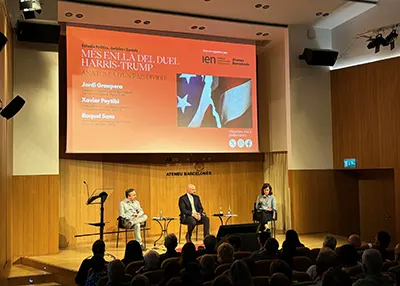
The first comment came from Xavier Peytibi, who addressed the heart of the matter: “The Republican Party has essentially become Trump’s Party.” Peytibi highlighted that anger is one of the main driving forces of current U.S. politics, with 65% of the population expressing feelings of frustration regarding the country’s political situation. According to Peytibi, Trump has made polarization a strategic tool, turning politics into a space where “you’re either with him or against him.”
Jordi Graupera, with a more ironic and provocative tone, added an interesting twist to the conversation by questioning the idea of extreme polarization. He suggested that, in fact, both Harris and Trump have shifted their discourse toward the center. Harris, according to Graupera, has moved away from the identity politics of the Democrats and now focuses on issues such as law and order, immigration, and the economy. Meanwhile, Trump has depolarized the racial debate, attracting the support of some minorities who previously backed the Democrats. Thus, Graupera suggested that U.S. society is not as divided as it might seem.
The Rural Vote and Trump’s Evolution
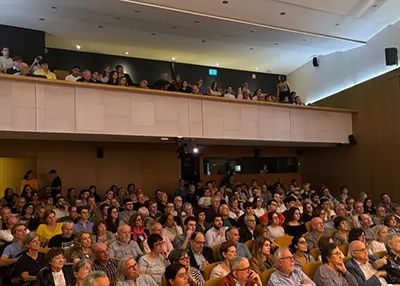
Raquel Sans steered the discussion toward the electoral map and the evolution of voting since 2016, focusing on the contrast between urban and rural voting. Graupera, in his characteristic style, delved into this issue, discussing the difference between industrial America and the rest of the country. Industrial states, he said, become decisive in the electoral race, as they are areas where the economy is a crucial factor. “When people feel they’re losing control of their lives, whether it’s because they’re losing their jobs or they see factories moving to Asia, that creates a sense of desperation that Trump has been able to capitalize on,” he concluded.
Peytibi, on the other hand, explained that Trump’s strength lies in his ability to connect with industrial areas that feel marginalized by globalization and offshoring. These voters, who have seen their economic circumstances deteriorate, are key to understanding Trump’s rise.
Trump’s Ascent: Beyond Traditional Politics
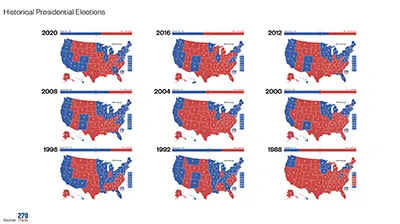
One of the questions that arose during the discussion was Donald Trump’s figure as a political phenomenon that transcends traditional norms. Peytibi emphasized how Trump has become a leader for millions of Americans who, until recently, felt disconnected from politics. “Trump is not just a politician; he’s a brand,” he stated. This “Trump brand” has tapped into a climate of distrust toward institutions and a general sense of disillusionment with political and media elites.
Peytibi went on to highlight that, despite his personal and political scandals, what keeps Trump at the center of the scene is his ability to communicate directly with the people, without filters. “His supporters aren’t looking for a perfect politician; they want someone who listens to them and speaks like them,” added the analyst. This emotional connection with voters has made Trump almost impervious to media criticism and has complicated efforts to delegitimize him, despite multiple attempts by his opponents.
Graupera expanded on this reflection, noting that Trump has been able to capitalize on deep-rooted dissatisfaction among sectors of the population who feel that globalization has left their communities behind. “Trump isn’t an anomaly; he’s a consequence,” Graupera asserted, referring to the disconnect between the ruling classes and the real concerns of the working class. According to Graupera, this frustration was exacerbated by the 2008 economic crisis, and since then, Trump has remained the only politician able to give voice to that anger.
Kamala Harris: An Opportunity or a Threat?
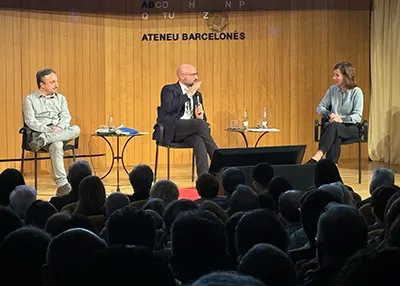
With a more positive outlook on the current vice president, Raquel Sans wanted to examine Kamala Harris’s role as a potential rival to Trump. Graupera suggested that Harris might struggle to capture the votes of the working-class sectors, especially those who traditionally voted Democrat but shifted to Trump in 2016. “Harris’s challenge will be how to reach out to these voters without losing the support of minorities and progressive young people,” he warned. If she fails to strike this balance, Harris could find herself in a situation where neither voting bloc mobilizes enough to ensure a Democratic victory.
While Harris has been a central figure in U.S. politics, Peytibi noted that her image has evolved. Although she began her political career focused on racial and social justice, she now seems to have adopted a more moderate stance to appeal to a broader electoral spectrum. “Harris wants to present herself as the rational alternative to Trump’s polarizing style,” Peytibi said.
The Power of Social Media
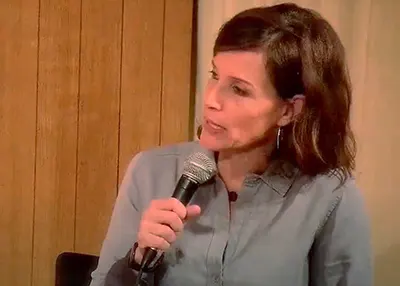
Political communication was also a key topic during the debate. Graupera remarked that the U.S. political system remains strong, despite the challenges and tensions Trump’s figure has generated. Although the debate about the threat to democracy has intensified, Graupera was optimistic: “American democracy is more robust than many want to believe. The United States is a much more serious country than we often think,” he stated.
In contrast, Peytibi emphasized the fundamental role of social media in Trump’s campaign, noting how he has used these platforms to bypass traditional media and directly address his followers. This, according to the communication expert, has allowed him to control the message much more effectively.
The Future of American Politics

Regarding the immediate future, both Peytibi and Graupera agreed that the 2024 elections will be extremely close. While Trump maintains strong emotional support among his voters, Harris has the opportunity to mobilize minorities and expand the Democratic electoral base. The big question, according to Peytibi, is whether the Democrats will be able to attract this crucial minority vote.
The debate concluded with a reflection on what is truly at stake in these elections. Peytibi expressed doubts about whether American democracy is at risk, while Graupera insisted that the real danger is a conflict of values: the battle between two radically different worldviews. “For Republicans, what’s at stake is their way of life, their values, their culture,” Graupera said. “If Trump returns to power, the change will be profound and will be felt, especially in relations with China, the European Union, and NATO.”
At the end of the event, Raquel Sans opened the floor to the audience, wrapping up a day of deep and passionate analysis on the future of U.S. politics and its global impact. All in all, an event where polarization, shifting discourses, and the ability to mobilize voters emerged as key issues that will shape the upcoming elections.
